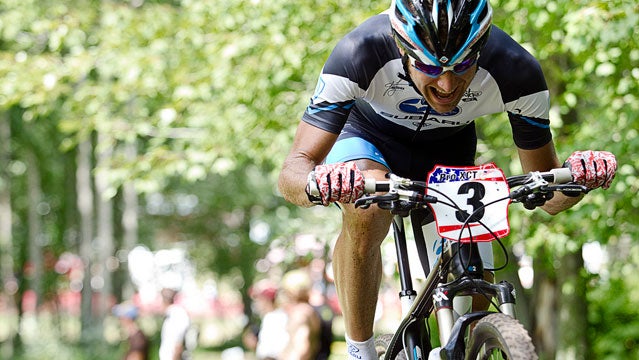For the past four years, mountain biker Jeremy Horgan-Kobelski has owned the cross-country race at , winning the event every year since 2009. The 34-year-old Coloradoan is one of the most experienced riders on the scene, with 20 years of competitive riding, 17 World Championship team appearances, and a visit to the Olympics under his belt.
Now, after two decades, Horgan-Kobelski says he’s ready for a change of pace. “I think that my high-level international racing days are probably in the rearview mirror at this point,” he says. But don’t write him off just yet: He’ll be returning to Vail this year to try for his fifth title. We called up Horgan-Kobelski to talk about how he’s preparing for the competition, and the new mountain-biking discipline that’s luring him away from cross-country.
���ϳԹ���: What have you been up to this year?
Jeremy Horgan-Kobelski: This is kind of a year of big changes and transitions for me. I’ve been doing the World Cup cross-country circuit for the last 10 to 12 years, and I felt like I really needed to change this year. I’ve shifted my focus away from cross-country and I’ve been focusing more on the enduro format.
Could you give a quick breakdown of what makes enduro different?
It’s multiple stages. Usually they’re point-to-points, pretty iconic trails. Certain sections are untimed, so you ride the transitions with the other competitors, and you get to talk and hang out. Then they time certain sections, and the race is determined by the addition of all those timed stages together.
They’re predominantly descending, but the transitions involve a lot of climbing, so it kind of rewards the best all-around rider. I think you’re going to see it increasingly on the radar over the next year or two. It’s a real, genuine kind of mountain biking that’s exciting to be a part of after so many years of World Cup XC racing.
Has your training routine changed?
When I was training full gas for Olympic-level XC, a typical ride for me would be about four, four-and-a-half hours with a lot of climbing, like 5,000-plus feet of vertical.
This year my rides are generally shorter, more like two or three hours, but incorporating more difficult technical trail riding, and working on the skills aspect more. I also do multiple weight workouts a week now.
What kind of races have you been doing?
I did a few races last year: Kennebec Pass in Durango, the Trestle Enduro in Winter Park. Then I ended the year with the Whole Enchilada in Moab.
But you’ll be returning to XC for the GoPro Mountain Games next weekend.
I’m not going into the GoPro games with the mentality that I have had the last couple of years, which was that I really wanted to win. I’m still doing some XC races, just because I really enjoy racing on courses that are really good and events that are really high quality. I’m doing it more just to be a part of the event. That said, I’m gonna go and give an honest effort, and see where I end up.
Do you expect the new enduro focus will affect your XC performance?
I’m certainly not quite as well prepared specifically for those longer XC efforts as I have been in the past, but hopefully I can pull something out of the hat, given the fact that I’ve got 20 years of training in the bank.
What kind of bike will you be riding at the Mountain Games?
I will be racing a 29-er. I don’t know which one yet, because Trek is literally launching the bike right now. I’ll either be on a Trek Superfly 100 or their new Fuel EX 29. The Fuel EX 29 has a little bit more suspension travel.
You and your wife Heather do a lot of racing together. Is she getting into enduro at all?
We actually put together this joint program this year. It’s so cool. After all these years of flying around the world and racing and just traveling on airplanes all the time, we bought an Airstream Safari in December. We’re driving around the US and Canada, going to all the best races we can find, mostly enduro.
You’ve spoken out against the UCI’s proposed ban on unsanctioned cycling events, which could end up being enforced next season.
I think there’s a place for a formal international development structure since mountain biking is in the Olympics, and there’s always gonna be a need for this development pipeline. But mountain biking has a really unique spirit in this country. A lot of people want to compete in events that are purely fun. They’re outside of this very strict rule-based system, and it benefits everybody to have the top Olympic professionals come to these races.
Mountain biking’s unique in that they’re gonna have to figure out a balance between allowing that grassroots growth with that high-level Olympic discipline.
You’ve been doing this for 20 seasons now. What first got you hooked?
I actually got into mountain biking on a high school trip, in 1992. We didn’t have high school racing then, but I fell in love immediately. I started racing, dragging my parents all over Colorado, the whole Colorado series. In a couple of years, I made the junior national team, went over to Europe, and raced. Now it’s an actual interscholastic sport in Colorado.
Is there anything you wish you’d been told when you were starting out?
I think there were times when I would be so stressed out when I was a junior or when I was at U23, like really trying to make it as a pro. I’d be devastated with a bad race or something like that. You’ve got a long time to show people what you can do. If you really have fun along the way, you’ll stick with it for a long time, and that’s what it takes more than anything else to have a career in the sport.


